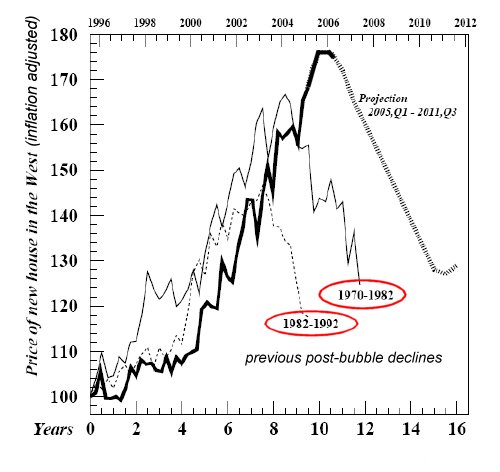In economics equilibrium, according to Wikipedia,
is simply a state of the world where economic forces are balanced and in the absence of external influences the (equilibrium) values of economic variables will not change. It is the point at which quantity demanded and quantity supplied are equal.
Everything will adjust eventually, attempting to move toward equilibrium, and that's what troubles me now. The adjustments will be painful.
The chief bubble is in housing. Here's a graph showing how it burst. These are home prices, from OfTwoMinds.
What we don't see is what's going on behind that downward slope on the graph. Louis Barnes, in the Boulder Reporter, describes it:
- Foreclosures in the second quarter were 4.5% of all mortgages (roughly 2.5 million of the fifty-million total).
- Delinquencies were at 14.4%.
- Eleven million households underwater versus mortgage balances, and another 2.4 million had negligible equity. Many, perhaps most of these households are not even delinquent, but can go to distressed sale or walk away at any time.
Then, we have:
Barely visible, the unknown millions holding on but approaching the end of their resources. I think most of the people who bought homes they could not afford, and with suicidal mortgages, are already down on the field. Most owners were and are prudent, prepared for two or three or four tough years — but now many have had five since housing rollover, three since recession began, and see no end. There is no way to measure their resilience.
Others aren't in immediate trouble, but:
Two-thirds, tens of millions, are deeply unsure of their ability to sell their homes at a price consistent with life-plans: tuitions, retirements, and the ability to relocate to a better job. Some fraction is not uncertain about the discount necessary to sell, but fully aware and paralyzed by the thought.
Here's a term to get used to: shadow inventory, explained at Weakonomics as:
The shadow inventory is the inventory of homes that are probably going to be for sale real soon.
And it ain't purty:
Estimates vary between 2 million and 8 million homes in the US. With sales expected to be 5.5 million this year, that’s a lot of inventory. The effects of such inventory will be to depress home prices. As soon as sales pick up people and banks will list homes to try to sell them. This will depress prices as there will again be more sellers than buyers. It could take years before all the shadow inventory is sold off, which means prices will be lower than what they could be.
Hang in there.

No comments:
Post a Comment